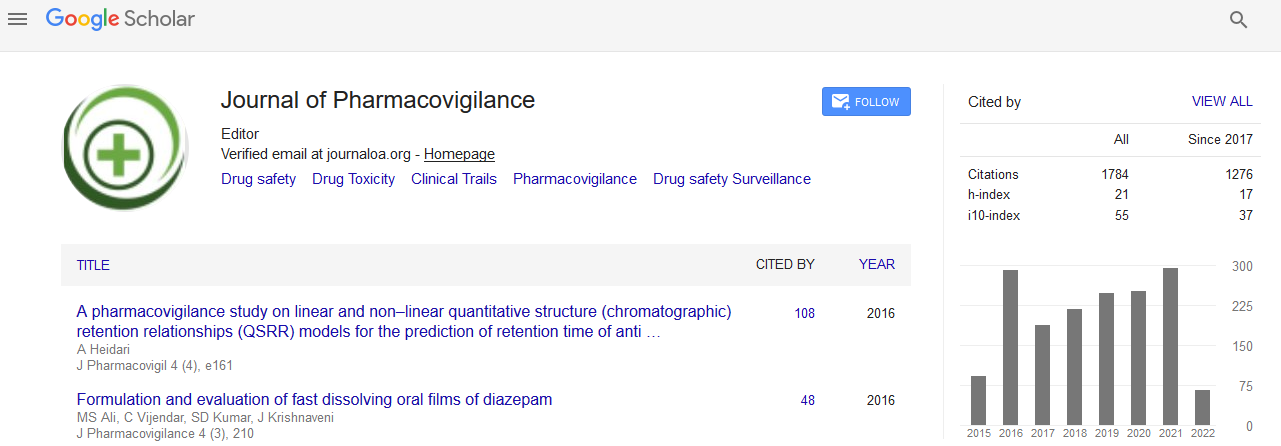Indexed In
- Open J Gate
- JournalTOCs
- The Global Impact Factor (GIF)
- RefSeek
- Hamdard University
- EBSCO A-Z
- OCLC- WorldCat
- Publons
- Euro Pub
- Google Scholar
Useful Links
Share This Page
Journal Flyer

Open Access Journals
- Agri and Aquaculture
- Biochemistry
- Bioinformatics & Systems Biology
- Business & Management
- Chemistry
- Clinical Sciences
- Engineering
- Food & Nutrition
- General Science
- Genetics & Molecular Biology
- Immunology & Microbiology
- Medical Sciences
- Neuroscience & Psychology
- Nursing & Health Care
- Pharmaceutical Sciences
Editor Note - (2020) Volume 8, Issue 3
A Brief Note Drug Dependence
James A Uchizono*Received: 10-Jul-2020 Published: 31-Jul-2020, DOI: 10.35248/2329-6887.20.8.283
Abstract
The thirty-eighth assembly of the World Health Organization (WHO) Expert Committee on Drug Dependence (ECDD) took put in Geneva, Switzerland from 14 to 18 November 2016. Dr Suzanne Slope, Chief, WHO Office of Fundamental Medications and Wellbeing Items (EMP), opened the assembly. She invited all members on sake of the WHO Director-General. Dr Marie-Paule Kieny, Collaborator Director-General, Wellbeing Frameworks and Development, of WHO, said thanks to the ECDD individuals for the time and exertion they had devoted to the intensive audit of the substances on the motivation of this ECDD assembly. She sketched out the central part of logical prove within the decision-making handle of Master Committees and in WHO’s standardizing and standard-setting part.
The thirty-eighth assembly of the World Health Organization (WHO) Expert Committee on Drug Dependence (ECDD) took put in Geneva, Switzerland from 14 to 18 November 2016. Dr Suzanne Slope, Chief, WHO Office of Fundamental Medications and Wellbeing Items (EMP), opened the assembly. She invited all members on sake of the WHO Director-General.
Dr Marie-Paule Kieny, Collaborator Director-General, Wellbeing Frameworks and Development, of WHO, said thanks to the ECDD individuals for the time and exertion they had devoted to the intensive audit of the substances on the motivation of this ECDD assembly. She sketched out the central part of logical prove within the decision-making handle of Master Committees and in WHO’s standardizing and standard-setting part.
Dr Kieny emphasized the significance of the universal sedate control traditions and of the suggestions of the Extraordinary Session of UN General Assembly Special Sessions (UNGASS) on the world sedate issue, that direct WHO’s work towards situating wellbeing at the middle of reactions to the world sedate issue and accomplishing the health-related Sustainable Development Goals (SDGs).
She emphasized the require for WHO to work closely with the United Nations Office on Drugs and Crime (UNODC), the International Narcotics Control Board (INCB) and other worldwide and territorial substances, as well as Part States, to realize productive and fruitful execution of the UNGASS operational suggestions and handle the world sedate issue.
The number of people with past-year reliance on a particular medicate was most noteworthy for pot (4.3 million), taken after by torment relievers (2.1 million), and after that cocaine (1.1 million).
The number of people with reliance on a torment reliever expanded from 1.4 million in 2004 to 2.1 million in 2012. So also, the number of people with heroin reliance in 2012 rose to around twice the number detailed in 2002 (467,000 vs. 214,000). In differentiate, rates of cannabis dependence remained the same and cocaine reliance rates diminished in 2012.
The age of introductory illegal sedate utilize is an vital indicator of ensuing drug dependence. Information from 2012 show that people who were 14 or more youthful when they to begin with attempted cannabis were six times more likely to have reliance on an unlawful medicate compared to those who detailed to begin with utilizing pot at age 18 or more seasoned (predominance rates = 13.2% vs. 2.2%).
In 2012 substance reliance (unlawful drugs and liquor) among men was roughly twice that of ladies (11.5% vs. 5.7%); be that as it may, between the ages of 12 to 17, men and ladies were around rise to in substance reliance rates. Business status was moreover related to rates of illegal sedate reliance in 2012 with higher rates detailed among people who were unemployed compared to those utilized full-time (16.9% vs. 9.1%).
Citation: James A Uchizono (2020) A Brief Note Drug Dependence. J Pharamacovigil. 8:283 doi-10.35248/2329-6887.20.8.283.
Copyright: © 2020 James A U. This is an open-access article distributed under the terms of the Creative Commons Attribution License, which permits unrestricted use, distribution, and reproduction in any medium, provided the original author and source are credited.


